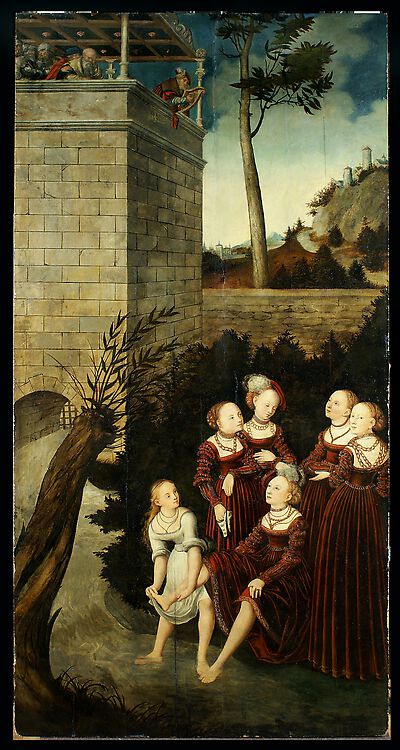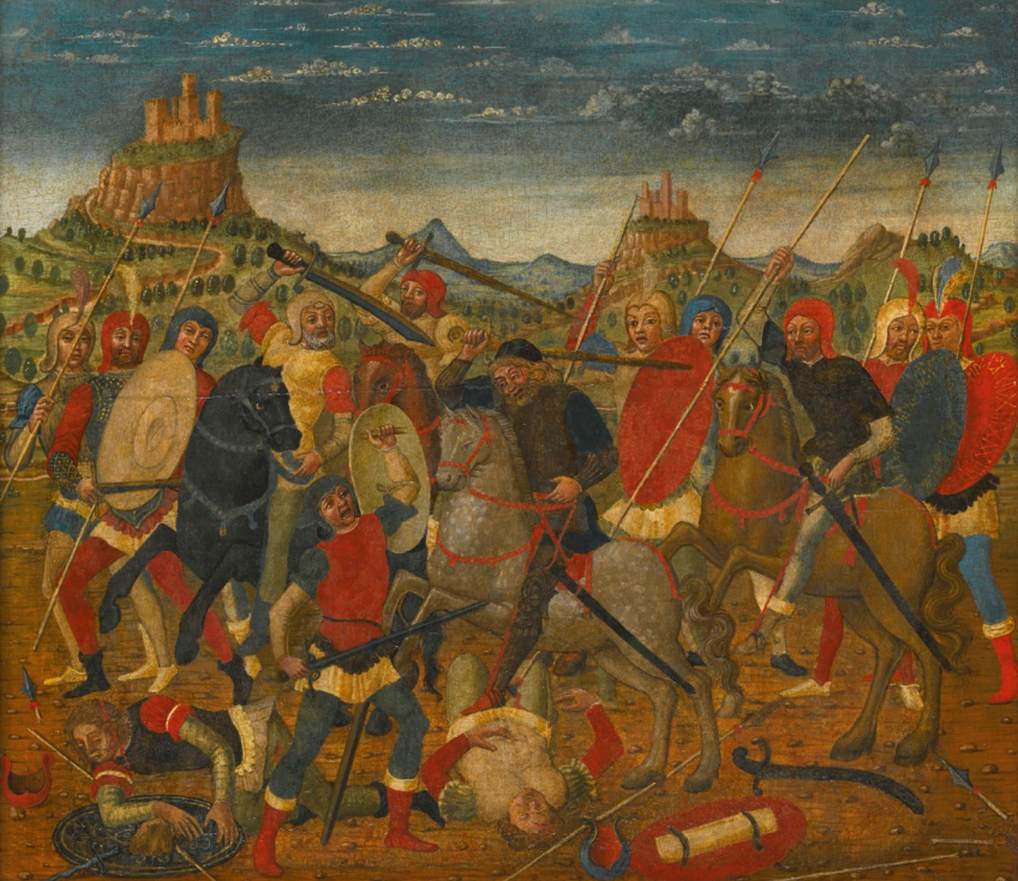The Sligo Presbyterian Church Wednesday Morning Bible Study is continuing its study of the Old Testament by looking at how God led David from watching a flock to leading a nation. Below is an outline for the series.
- Session 1 - 1 Samuel 1:1–4:1
- Session 2 - 1 Samuel 4:2–7:17
- Session 3 - 1 Samuel 8:1–10:27
- Session 4 - 1 Samuel 11:1–12:25
- Session 5 - 1 Samuel 13:1–15:35
- Session 6 - 1 Samuel 16:1–17:58
- Session 7 - 1 Samuel 18:1–20:42
- Session 8 - 1 Samuel 21:1–23:29
- Session 9 - 1 Samuel 24:1–26:25
- Session 10 - 1 Samuel 27:1–29:11
- Session 11 - 1 Samuel 30:1–31:13
- Session 12 - 2 Samuel 1:1–3:21
- Session 13 - 2 Samuel 3:22–5:10
- Session 14 - 2 Samuel 5:11–8:18
- Session 15 - 2 Samuel 9:1–11:27
- Session 16 - 2 Samuel 12:1–14:33
- Session 17 - 2 Samuel 15:1–18:8
- Session 18 - 2 Samuel 18:9–20:26
- Session 19 - 2 Samuel 21:1–24:25
During our fifteenth session, we discussed David's fall from grace, 2 Samuel 9:1–11:27. Below is a recording of our discussion and the text from 2 Samuel.
2 Samuel 9:1–11:27 [New Revised Standard]
David asked, “Is there still anyone left of the house of Saul to whom I may show kindness for Jonathan’s sake?” Now there was a servant of the house of Saul whose name was Ziba, and he was summoned to David. The king said to him, “Are you Ziba?” And he said, “At your service!” The king said, “Is there anyone remaining of the house of Saul to whom I may show the kindness of God?” Ziba said to the king, “There remains a son of Jonathan; he is crippled in his feet.” The king said to him, “Where is he?” Ziba said to the king, “He is in the house of Machir son of Ammiel, at Lo-debar.” Then King David sent and brought him from the house of Machir son of Ammiel, at Lo-debar. Mephibosheth son of Jonathan son of Saul came to David, and fell on his face and did obeisance. David said, “Mephibosheth!” He answered, “I am your servant.” David said to him, “Do not be afraid, for I will show you kindness for the sake of your father Jonathan; I will restore to you all the land of your grandfather Saul, and you yourself shall eat at my table always.” He did obeisance and said, “What is your servant, that you should look upon a dead dog such as I?”
Then the king summoned Saul’s servant Ziba, and said to him, “All that belonged to Saul and to all his house I have given to your master’s grandson. You and your sons and your servants shall till the land for him, and shall bring in the produce, so that your master’s grandson may have food to eat; but your master’s grandson Mephibosheth shall always eat at my table.” Now Ziba had fifteen sons and twenty servants. Then Ziba said to the king, “According to all that my lord the king commands his servant, so your servant will do.” Mephibosheth ate at David’s table, like one of the king’s sons. Mephibosheth had a young son whose name was Mica. And all who lived in Ziba’s house became Mephibosheth’s servants. Mephibosheth lived in Jerusalem, for he always ate at the king’s table. Now he was lame in both his feet.
Some time afterward, the king of the Ammonites died, and his son Hanun succeeded him. David said, “I will deal loyally with Hanun son of Nahash, just as his father dealt loyally with me.” So David sent envoys to console him concerning his father. When David’s envoys came into the land of the Ammonites, the princes of the Ammonites said to their lord Hanun, “Do you really think that David is honoring your father just because he has sent messengers with condolences to you? Has not David sent his envoys to you to search the city, to spy it out, and to overthrow it?” So Hanun seized David’s envoys, shaved off half the beard of each, cut off their garments in the middle at their hips, and sent them away. When David was told, he sent to meet them, for the men were greatly ashamed. The king said, “Remain at Jericho until your beards have grown, and then return.”
When the Ammonites saw that they had become odious to David, the Ammonites sent and hired the Arameans of Beth-rehob and the Arameans of Zobah, twenty thousand foot soldiers, as well as the king of Maacah, one thousand men, and the men of Tob, twelve thousand men. When David heard of it, he sent Joab and all the army with the warriors. The Ammonites came out and drew up in battle array at the entrance of the gate; but the Arameans of Zobah and of Rehob, and the men of Tob and Maacah, were by themselves in the open country. When Joab saw that the battle was set against him both in front and in the rear, he chose some of the picked men of Israel, and arrayed them against the Arameans; the rest of his men he put in the charge of his brother Abishai, and he arrayed them against the Ammonites. He said, “If the Arameans are too strong for me, then you shall help me; but if the Ammonites are too strong for you, then I will come and help you. Be strong, and let us be courageous for the sake of our people, and for the cities of our God; and may the Lord do what seems good to him.” So Joab and the people who were with him moved forward into battle against the Arameans; and they fled before him. When the Ammonites saw that the Arameans fled, they likewise fled before Abishai, and entered the city. Then Joab returned from fighting against the Ammonites, and came to Jerusalem.
But when the Arameans saw that they had been defeated by Israel, they gathered themselves together. Hadadezer sent and brought out the Arameans who were beyond the Euphrates; and they came to Helam, with Shobach the commander of the army of Hadadezer at their head. When it was told David, he gathered all Israel together, and crossed the Jordan, and came to Helam. The Arameans arrayed themselves against David and fought with him. The Arameans fled before Israel; and David killed of the Arameans seven hundred chariot teams, and forty thousand horsemen, and wounded Shobach the commander of their army, so that he died there. When all the kings who were servants of Hadadezer saw that they had been defeated by Israel, they made peace with Israel, and became subject to them. So the Arameans were afraid to help the Ammonites any more.
In the spring of the year, the time when kings go out to battle, David sent Joab with his officers and all Israel with him; they ravaged the Ammonites, and besieged Rabbah. But David remained at Jerusalem. It happened, late one afternoon, when David rose from his couch and was walking about on the roof of the king’s house, that he saw from the roof a woman bathing; the woman was very beautiful. David sent someone to inquire about the woman. It was reported, “This is Bathsheba daughter of Eliam, the wife of Uriah the Hittite.” So David sent messengers to get her, and she came to him, and he lay with her. (Now she was purifying herself after her period.) Then she returned to her house. The woman conceived; and she sent and told David, “I am pregnant.”
So David sent word to Joab, “Send me Uriah the Hittite.” And Joab sent Uriah to David. When Uriah came to him, David asked how Joab and the people fared, and how the war was going. Then David said to Uriah, “Go down to your house, and wash your feet.” Uriah went out of the king’s house, and there followed him a present from the king. But Uriah slept at the entrance of the king’s house with all the servants of his lord, and did not go down to his house. When they told David, “Uriah did not go down to his house,” David said to Uriah, “You have just come from a journey. Why did you not go down to your house?” Uriah said to David, “The ark and Israel and Judah remain in booths; and my lord Joab and the servants of my lord are camping in the open field; shall I then go to my house, to eat and to drink, and to lie with my wife? As you live, and as your soul lives, I will not do such a thing.” Then David said to Uriah, “Remain here today also, and tomorrow I will send you back.” So Uriah remained in Jerusalem that day. On the next day, David invited him to eat and drink in his presence and made him drunk; and in the evening he went out to lie on his couch with the servants of his lord, but he did not go down to his house.
In the morning David wrote a letter to Joab, and sent it by the hand of Uriah. In the letter he wrote, “Set Uriah in the forefront of the hardest fighting, and then draw back from him, so that he may be struck down and die.” As Joab was besieging the city, he assigned Uriah to the place where he knew there were valiant warriors. The men of the city came out and fought with Joab; and some of the servants of David among the people fell. Uriah the Hittite was killed as well. Then Joab sent and told David all the news about the fighting; and he instructed the messenger, “When you have finished telling the king all the news about the fighting, then, if the king’s anger rises, and if he says to you, ‘Why did you go so near the city to fight? Did you not know that they would shoot from the wall? Who killed Abimelech son of Jerubbaal? Did not a woman throw an upper millstone on him from the wall, so that he died at Thebez? Why did you go so near the wall?’ then you shall say, ‘Your servant Uriah the Hittite is dead too.’” So the messenger went, and came and told David all that Joab had sent him to tell. The messenger said to David, “The men gained an advantage over us, and came out against us in the field; but we drove them back to the entrance of the gate. Then the archers shot at your servants from the wall; some of the king’s servants are dead; and your servant Uriah the Hittite is dead also.” David said to the messenger, “Thus you shall say to Joab, ‘Do not let this matter trouble you, for the sword devours now one and now another; press your attack on the city, and overthrow it.’ And encourage him.” When the wife of Uriah heard that her husband was dead, she made lamentation for him. When the mourning was over, David sent and brought her to his house, and she became his wife, and bore him a son. But the thing that David had done displeased the Lord,
.jpg)





No comments:
Post a Comment